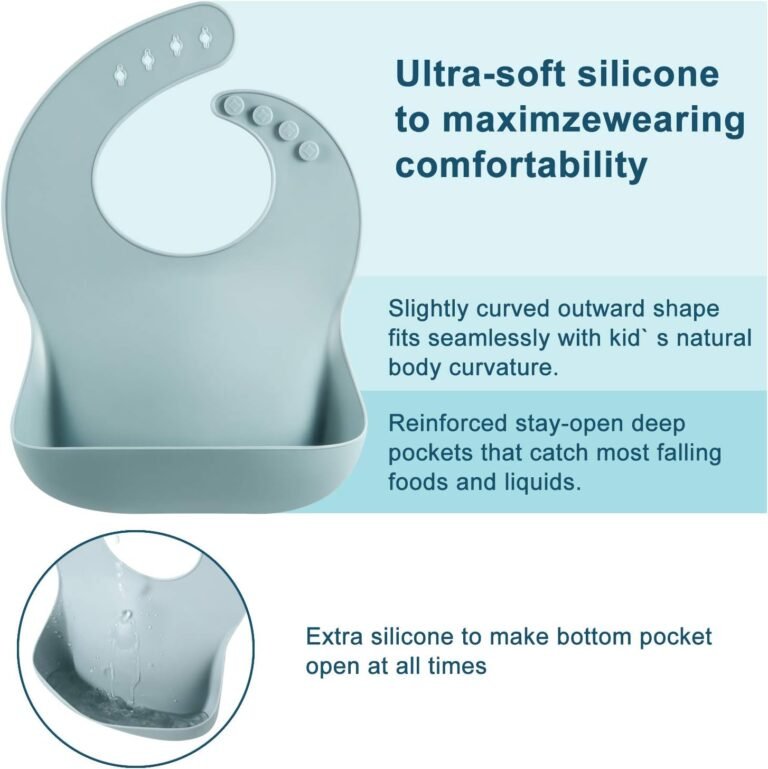How to Use Word Search Puzzles for Preschool Learning at Home
Using word search puzzles can be a fun and effective way to support your preschooler's learning at home. These puzzles not only engage young minds but also help build vocabulary and critical thinking skills. By selecting themes that resonate with their interests, you can make the experience enjoyable and educational. Curious about how to create and incorporate these puzzles into your daily routine? Let's explore some practical strategies to get started.
Key Takeaways
- Choose engaging themes like animals or colors that align with preschoolers' interests to make word searches relatable and fun.
- Create custom word searches using simple, familiar words to enhance vocabulary and language acquisition.
- Incorporate word searches into daily routines, linking themes to activities like grocery shopping or zoo visits for relevance.
- Encourage teamwork and discussion while solving puzzles to foster social interaction and deepen understanding of words.
- Celebrate achievements with rewards or creative activities, such as collages, to boost motivation and reinforce learning.
Understanding the Benefits of Word Search Puzzles
When you introduce word search puzzles to preschoolers, you're not just providing them with a fun activity; you're also fostering essential cognitive skills.
These puzzles stimulate cognitive development by encouraging critical thinking and problem-solving as children search for words. As they navigate the grid, they're honing their visual discrimination and attention to detail.
Additionally, word searches play a crucial role in language acquisition. By exposing kids to new vocabulary, they enhance their language skills, learning how words are spelled and used in context.
This interactive approach makes learning enjoyable, helping to reinforce what they know while introducing fresh concepts.
Ultimately, incorporating word search puzzles can significantly contribute to a preschooler's overall growth and love for learning.
Choosing the Right Word Search Themes for Preschoolers
Choosing the right themes for word search puzzles can make all the difference in keeping preschoolers engaged and excited about learning. When considering theme selection, focus on topics that resonate with their interests, such as animals, colors, or their favorite storybook characters. This helps maintain their curiosity and makes the activity enjoyable.
It's also crucial to ensure age appropriateness; use simple, familiar words they can recognize and sound out. For instance, a puzzle featuring farm animals or shapes can capture their attention and reinforce vocabulary.
Creating Custom Word Searches at Home
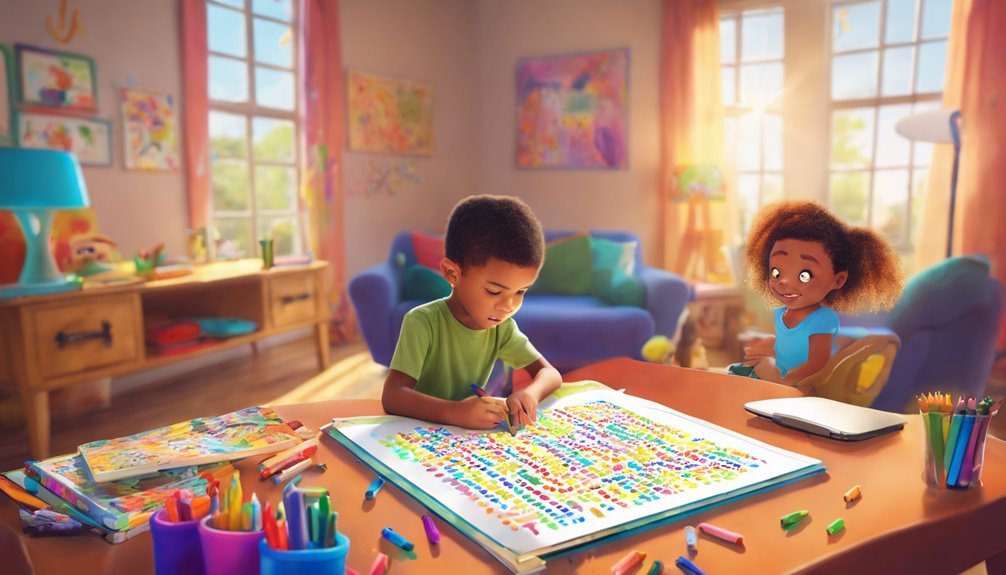
Creating custom word searches at home can be a fun way to personalize the learning experience for your preschooler. Start by choosing custom themes that relate to their interests, like animals, colors, or their favorite storybooks.
Once you have your theme, brainstorm a list of age-appropriate words to include. You can create printable puzzles using online templates or word search generators that make it quick and easy.
After printing, enjoy solving the puzzle together! This not only enhances their vocabulary but also promotes critical thinking skills. As they search for words, encourage discussion about each term to deepen their understanding.
Custom word searches can transform learning into an exciting adventure, keeping your preschooler engaged and eager to explore more!
Incorporating Word Searches Into Daily Routines
Incorporating word searches into your daily routines can turn ordinary moments into fun learning opportunities for your preschooler. Start by designating specific times for puzzle timing, like during breakfast or before bed. This consistent approach not only makes learning a habit but also builds excitement.
You can even weave themes into word searches that align with your day—like animals on zoo day or food on grocery day. Encourage your child to spot words together, fostering teamwork and communication.
As you integrate these puzzles, be sure to celebrate their achievements, big or small. Soon, you'll see your preschooler developing vocabulary and problem-solving skills while enjoying quality time with you. Make learning a joyful part of your everyday life!
Making Word Searches Interactive and Fun
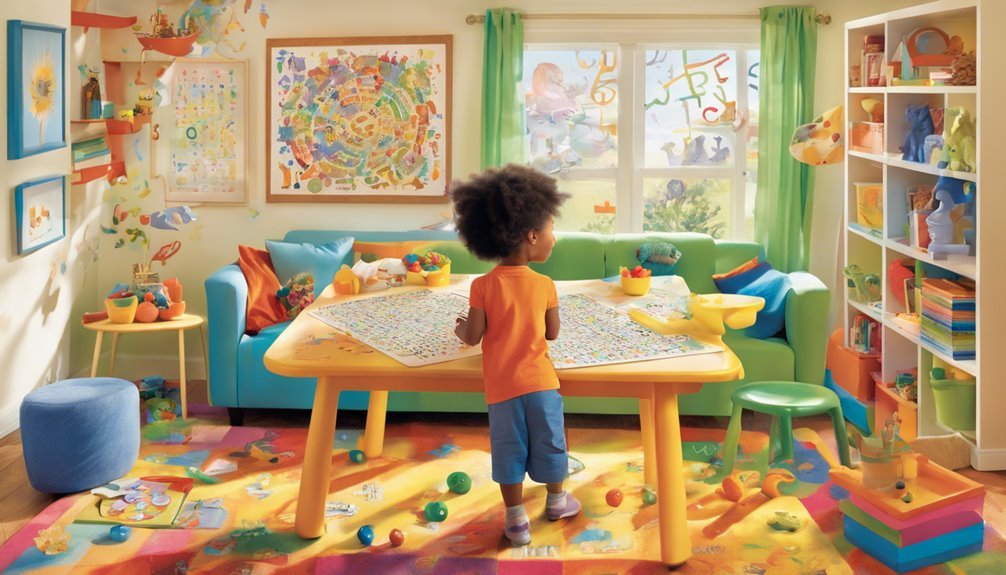
To make word searches even more engaging for your preschooler, think about adding interactive elements that spark their curiosity. You can turn the word search into a fun adventure by creating themed puzzles that relate to their interests, like animals or colors.
Encourage them to engage in interactive play by timing how fast they can find words or challenging them to locate specific words first. To elevate the excitement, offer rewards for completing puzzle challenges, such as stickers or extra playtime.
You might also consider pairing the word search with a related activity, like drawing one of the hidden words. These strategies not only make the experience enjoyable but also foster a love for learning through playful engagement.
Using Word Searches to Build Vocabulary
Word searches can be a fantastic tool for building vocabulary in preschoolers. As your child hunts for words, they'll enhance their word recognition skills and discover new terms in a fun way.
Choose themed word searches that introduce specific vocabulary, like animals or colors, to make learning more engaging.
Encourage your little one to say each word out loud as they find it; this reinforces memory and pronunciation. After completing the search, discuss the meanings of the words together. You can even create sentences using the new words to deepen understanding.
With consistent practice, word searches can significantly contribute to vocabulary building, paving the way for stronger reading and communication skills as your child grows.
Enhancing Spelling Skills With Word Searches
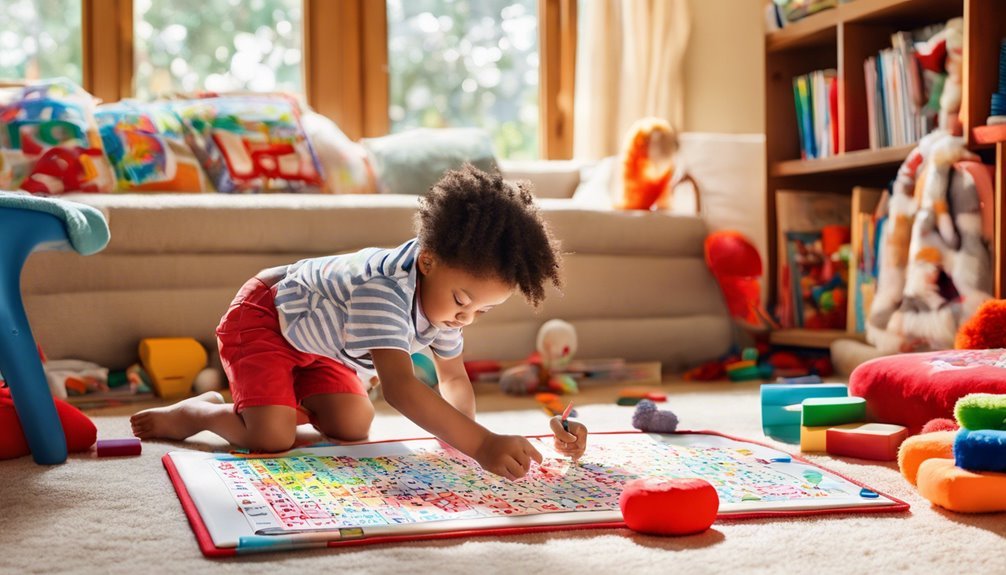
Finding words in a puzzle doesn't just boost vocabulary; it can also sharpen spelling skills in preschoolers. As your child discovers words, they'll start to recognize spelling patterns that make learning fun and effective. Each time they spot a word, they're engaging in vocabulary recognition, reinforcing how letters come together to form words.
Try selecting puzzles that feature words with similar endings or beginnings, like "cat," "bat," and "hat." This helps them see the connections between words, enhancing their spelling ability.
Encourage them to say the words out loud after finding them, which aids in memory retention. With consistent practice, word searches can transform spelling from a chore into an enjoyable adventure for your little one!
Encouraging Critical Thinking Through Puzzles
While you might think puzzles are just fun games, they actually offer a fantastic way to encourage critical thinking in preschoolers. When your child engages with word search puzzles, they develop important puzzle strategies, like scanning and identifying patterns.
These strategies help them enhance their critical reasoning skills as they learn to connect letters and words in meaningful ways. As you guide them through the puzzles, ask open-ended questions that prompt them to think deeper, such as, "What words do you notice?" or "How did you find that word?"
This interactive approach not only makes the experience enjoyable but also sharpens their analytical skills, laying a solid foundation for future learning. Embrace the fun and watch their thinking skills blossom!
Adapting Word Searches for Different Learning Levels
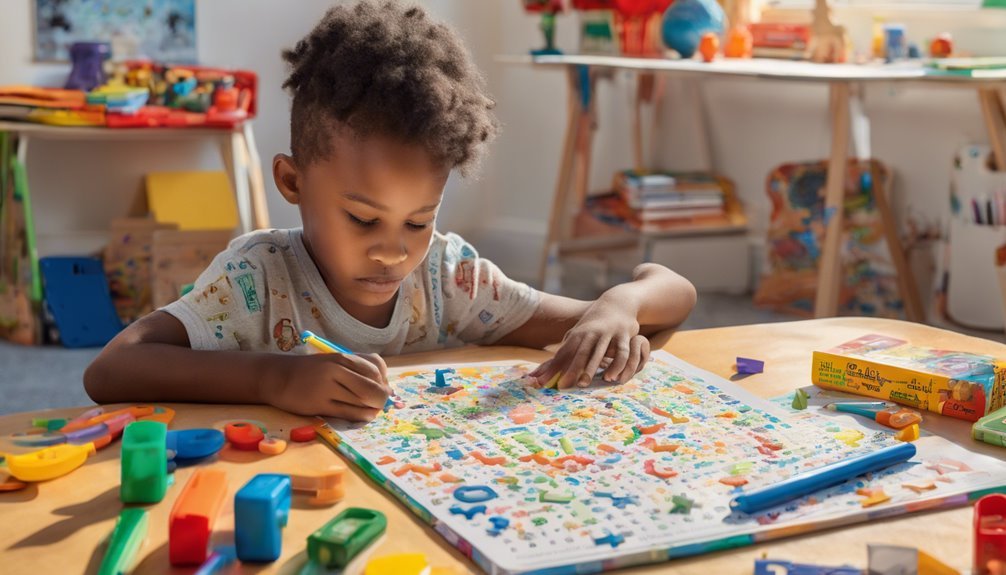
To ensure every child gets the most out of word search puzzles, it's essential to adapt them to various learning levels.
Start with simple word search adaptations for beginners, using fewer words and larger fonts. As your child gains confidence, gradually increase the difficulty levels by adding more words or using smaller grids.
For advanced learners, try thematic puzzles that challenge them to find words related to specific topics, enhancing both vocabulary and critical thinking. You could also introduce diagonal or backward words for an extra twist!
Tailoring the puzzles this way keeps them engaging and ensures your child's learning experience remains fun and effective, allowing them to master new skills at their own pace.
Combining Word Searches With Other Educational Activities
Word searches can be a fantastic springboard for combining learning with play, making the educational experience even more dynamic. You can enhance your child's learning by integrating various educational activities alongside word search variations and thematic puzzles.
Here are some ideas to get you started:
- Art Projects: Create drawings based on words found in the puzzles.
- Storytelling: Encourage your child to craft a short story using the words.
- Games: Turn the word search into a race or a timed challenge.
- Crafts: Make a themed collage using words as inspiration.
- Discussions: Discuss the meanings of the words to deepen understanding.
Frequently Asked Questions
How Long Should a Word Search Puzzle Be for Preschoolers?
When you're creating a word search puzzle for preschoolers, aim for an appropriate length of 5 to 8 words. This ensures the puzzle isn't overwhelming.
Keep the puzzle complexity low; use simple, familiar words that they can easily recognize. By doing this, you'll help them build confidence and enjoyment in solving puzzles.
Can Word Searches Improve Fine Motor Skills in Children?
Imagine a young artist, carefully painting a masterpiece. Just like that, word searches can sharpen your child's fine motor skills.
As they trace letters with a pencil, they're not just searching for words; they're enhancing their hand-eye coordination, which supports cognitive development. Each letter they circle strengthens those tiny muscles in their hands.
What Age Is Best to Introduce Word Searches?
You can introduce word searches around ages 4 to 5, when kids start developing their reading and vocabulary skills.
At this age, they'll enjoy the challenge and discover word search benefits, like improving focus and problem-solving.
It's a fun way to enhance preschool learning while building fine motor skills.
Just remember to choose simple puzzles with familiar words to keep them engaged and motivated as they explore this enjoyable learning activity.
How Often Should We Do Word Searches for Learning?
Think of word searches as delightful little treasure hunts for your brain!
To boost learning retention, aim for a frequency of two to three sessions per week. This rhythm keeps the excitement alive while reinforcing vocabulary.
If you notice your child's engagement waning, feel free to adjust the frequency. Remember, it's all about finding that sweet spot where learning flourishes without becoming a chore.
Happy hunting!
Are There Digital Word Search Options for Preschoolers?
Absolutely, there are plenty of digital word search options for preschoolers!
You can explore various online resources that offer interactive puzzles designed just for young learners. These digital puzzles make learning fun and engaging, as kids can practice their vocabulary while enjoying colorful graphics and sounds.
Plus, many sites allow you to customize puzzles, ensuring they match your child's interests and skill level. Try a few out and watch their excitement grow!
Conclusion
Incorporating word search puzzles into your preschooler's learning routine can be like planting seeds in a garden; with a little care, they'll blossom into strong skills. By choosing fun themes and making activities interactive, you'll spark curiosity and enhance vocabulary. Remember, it's not just about finding words—it's about nurturing a love for learning together. So grab those puzzles, dive into the fun, and watch your child's confidence grow as they explore the world of words!








